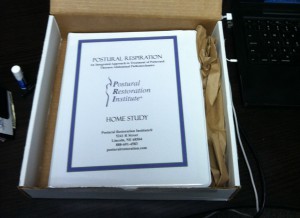A couple days ago I announced that we will be hosting the first Postural Restoration Institute Course between Baltimore and Boston on November 10-11 at Endeavor Sports Performance.
For more information regarding the course, check out at that post here: Postural Restoration Institute Comes to Endeavor
The course that we’re hosting, Myokinematic Restoration, is also available as a home study. Over the last year, I’ve had several colleagues reach out to me and ask whether they should take the course in person or as a home study, which is a great question. At this point, I’ve taken Myokinematic Restoration and Postural Respiration as home studies, and Impingements & Instabilities and Advanced Integration in person.

I took the first two as home study courses for three basic reasons:
Maybe I’m being overly simplistic, but I imagine this is basically the argument or concern that everyone has. As the saying goes, hindsight is always 20/20, and I can say now that I regret taking not just shelling out the extra loot to take in person. Here are a few of the main reasons why:
Ultimately, PRI is teaching a way of thinking AND a skill set, and it’s fairly difficult to fully develop either while you’re taking it at home. This isn’t to say that the home study doesn’t have any value; in fact, the home studies are incredibly valuable if that’s all you can do, but once you understand how powerful their methods can be, it’s better to get as much as you possibly can out of each course, which you’re best suited by taking the course live. If you can make it, look into our seminar in November (PRI’s Myokinematic Restoration). If you can’t, look into any of the other courses they’re hosting over the last several months. You’ll be happy you did! Stay tuned for information on integrating PRI into performance settings soon.
To your success,
Kevin Neeld
Please enter your first name and email below to sign up for my FREE Athletic Development and Hockey Training Newsletter!